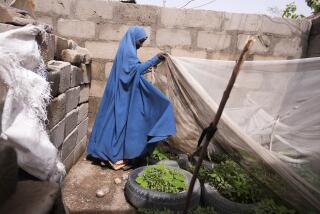UNICEF Urges Marshall Plan for Third World
- Share via
World leaders should launch a new Marshall Plan to stem the rapid slide of developing nations into poverty and the resultant deaths of millions of children, the U.N. Children’s Fund said Tuesday.
In officially releasing its report, “The State of the World’s Children 1989,” in New Delhi, UNICEF called for a summit meeting to reinvigorate struggling economies by drastic reductions of debt loads that have forced Third World countries to cut social spending.
After nearly 40 years of progress, the UNICEF report declared, numerous developing nations are now slipping deeper and deeper into poverty. The heaviest consequences, UNICEF executive director James P. Grant said, are “being borne by the children.”
In the past year, the report estimated, half a million children--in Africa, Asia, the Caribbean and Latin America--have died as the direct result of the development slowdown and reversal.
In an internationally telecast news conference from New Delhi, Grant said: “Children are facing the worst of times--and potentially the best of times.
“They are the worst of times because after 35 years of progress, a significant percentage of mankind--900 million people--is now sliding backward into poverty,” he said.
“It’s the best of times because low-cost ways (of preventing children’s deaths) are becoming increasingly available.”
It was the first time that UNICEF’s annual report has been issued in a Third World capital. On the 10th anniversary of the International Year of the Child, the organization is attempting to focus attention on the disastrous effects of the global recession on the world’s most vulnerable.
It recommended a 30% debt relief for developing countries, open trade and increased foreign aid earmarked for alleviation of poverty. UNICEF estimated the total additional investment necessary to meet basic human needs throughout the 1990s at $30 billion to $50 billion a year. It said such sums devoted to food and nutrition, primary health care and education as well as safe water and sanitation could wipe out the worst aspects of poverty in little more than a decade.
“The total required,” Grant said, “is considerably less than one-half of 1% of today’s $13-trillion world economy--a minuscule amount in relation to the great human and economic advances it could help to achieve.”
He added: “UNICEF calls, though belatedly, for (economic) adjustment with a human face.”
In pressing for an all-out effort like the Marshall Plan, which helped Europe recover after World War II, UNICEF said raw material prices on which many emerging nations depend for funds to alleviate poverty should be stabilized.
Struggling nations would thus be able to buy the products of industrialized countries, which would help trim massive trade deficits confronting the latter, UNICEF argued.
“A plan of action to break the logjam of development and open the way to global growth will require vision and leadership of an unusually high order,” the report stressed.
UNICEF called upon commercial banks, which hold about 60% of the developing world’s debt, to “brace themselves to bear a significant part of the losses involved in debt reduction.”
At a news conference in downtown Los Angeles on Tuesday, Mohammed Forouzesh, Cal State Long Beach professor of health sciences, said, “More than 3 million children under 5 years of age die every year because of dehydration, and 80% of those are under 2.”
Priscilla Slocum, vice president of field services of the U.S. Committee for UNICEF, said at the Sheraton Grande press conference: “It is immoral to sit back. . . . Children are starving because governments are spending more on the military than education and social service.”
The UNICEF report noted: “Unlike the tragedy of drought or flood or famine, this tragedy of development’s reversal cannot easily be captured by the media and brought to the attention of the worldwide public. It is happening not in any one particular place but in slums and shanties and neglected rural communities across two continents.”
UNICEF pointed out that the average investment rate in Latin America has sunk from 24.5% during the 1970s to 16.5% today.
“Inevitably, the situation in Africa is even worse,” the report said. “The outflow of more than a quarter of the subcontinent’s earnings, for the purposes of servicing debts, means that a return to economic health is almost impossible for most of the nations of the region.”
More to Read
Sign up for Essential California
The most important California stories and recommendations in your inbox every morning.
You may occasionally receive promotional content from the Los Angeles Times.













